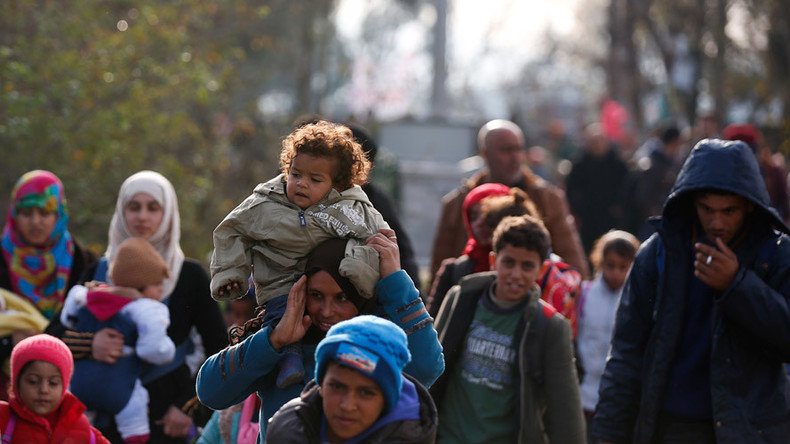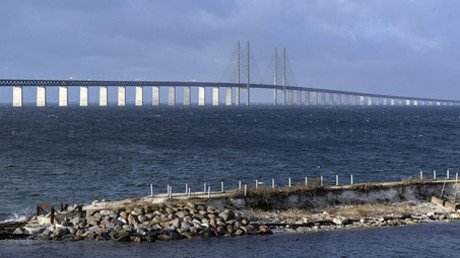Sweden ‘has hit its limit’ on accepting refuges – govt

Sweden has approved new measures to cope with the refugee influx, since the state has no more capacity to accept refugees, according to Swedish Migration Minister.
The Swedish ruling center-left coalition confirmed on Wednesday that regular ID checks on every transport route leading to the country will be introduced early 2016 as it struggles to cope with an unending inflow of refugees seeking shelter in the Nordic state.
The new measures will affect buses, ferries and trains mostly impacting railway traffic between the Danish capital of Copenhagen and the major Swedish city of Malmo over the Oresund Bridge regularly used by thousands of commuters from both countries.
Sweden and Denmark exchanged shots over each other’s asylum policies in light of Sweden toughening border controls and curbing refugee influx to the country, with Denmark fearing that it could affect both its economy as well as its own asylum policy.
Swedish authorities admit that this decision carries potential disadvantages as well as some economic risks for both sides, although they claim that any alternative would trigger far worse consequences for the country.
"It will be more difficult and it will affect the frequency (of trains) but that should always be weighed against: what is the alternative if we do not act?" Swedish Migration Minister Morgan Johansson said at a press conference on Wednesday.
He also added that the checks would be held on the Danish side of the border and that the Danish government had been informed.
“They [the Danish government] understand as well that this is going to cause problems on the Danish side,” he said referring to the border checks.
The minister also stressed that his country had already done far more than its fair share in order to help Europe cope with the largest refugee crisis since the WWII rebuking Denmark for not doing enough at the same time.
“We have hit our limit. Denmark has not,” he said referring to accepting asylum seekers.
‘Simply don't know where they are’: 14,000 illegal migrants vanish, Swedish police say https://t.co/UHEWeuoEotpic.twitter.com/ThTp9vemMe
— RT (@RT_com) December 2, 2015This statement of the Swedish minister alongside with Sweden introducing stricter border controls has caused a wave of indignation among the Danish politicians.
Denmark’s Prime Minister Lokke Rasmussen told Swedes they should address their own problems instead of criticizing Denmark.
“It’s not up to the Swedes to judge Danish immigration policies,” Rasmussen said in an interview to the Danish TV2 News.
The prime minister also emphasized that imposing checks on the Oresund bridge could have negative consequences of the growth of the region.
“The Swedes have had their own immigration policies and they are apparently overcome by it. And what is coming now is that one is implementing instruments that will in reality force the development in the Oresund Region backwards, with a risk of lost jobs and prosperity,” he commented on the issue.
Swedish police raid #refugee shelter, arrest suspected attack-plotting terrorist https://t.co/SnHXqK4tkJpic.twitter.com/ny0VFCbd7C
— RT (@RT_com) November 20, 2015Last week, the Swedish government announced that it was working on a bill that would allow them even to close the bridge temporarily as an “emergency measure” if it would be necessary to slow the refugee influx.
In November, Sweden also addressed Denmark asking it to take in more refugees thus lightening the Sweden’s burden but Danish authorities refused provoking an exchange of criticism between the two countries over their asylum policies.
“That is a Swedish problem. It is created by Sweden, it’s not created by us,” Rasmussen said in a recent interview to TV2 NEWs.
“If they want to turn Stockholm, Gothenburg or Malmo into a Scandinavian Beirut, with clan wars, honor killings and gang rapes, let them do it. We can always put a barrier on the Oresund Bridge,” Pia Kjaersgaard, founder and former leader of the anti-immigration Danish People’s Party said last week in the view of the Swedish government considering temporary Oresund bridge closure.
Sweden imposes temporary border controls to deal with migrants https://t.co/pOF6vEXlNNpic.twitter.com/I63fvVtwKa
— RT (@RT_com) November 12, 2015Denmark has received about 18,000 refugees so far, while Sweden is expected to take in around 190,000 asylum seekers by the end of the year.
In the meantime, Sweden’s toughening of border controls could result in more refugees claiming asylum in Denmark instead of Sweden, Danish Jyllands-Posten reports citing several experts on the issue. In the view of such scenario, Denmark’s authorities are now debating potential introduction of similar measures on its border with Germany.
Berlin refugee center chief resigned over ‘chaos’
Meanwhile, in Germany, the head of the Berlin’s main refugee registration center was forced to resign over ‘chaotic conditions’ in the facility as well as inefficiency as the office was struggling with the record number of new arrivals, AFP reports.
Franz Allert stepped down on Wednesday shortly after Berlin’s mayor Michael Muller openly said in an interview to the local radio RBB that the center, known under its acronym Lageso, needed “new leadership.”
Germany ablaze: over 200 attacks on refugee homes, only 4 convictions https://t.co/K9cNE3HVCopic.twitter.com/biEJ75l2O6
— RT (@RT_com) December 5, 2015Earlier, the center was repeatedly criticized for poor conditions refugees had to endure as they were waiting for the initial interview needed to process their asylum requests. Hundreds of men, women and children had to crowd in an unsheltered dirt courtyard sometimes for weeks with only volunteers handing out warm drinks, food and cloth to them, AFP reports.
The crowds were contained by the security guards with police intervening in case of scuffles.
Claudia Roth, the head of the Green Party’s fraction in German parliament, described the situation in the center as "shocking and unworthy of a democratic society."
The refugees there “endure the queues, sometimes in the mud, rain and storm, often tightly packed into closed-off areas, tents or buildings, with no guarantee that their suffering will be worth it,” she wrote in an open letter to the Berlin’s mayor, as reported by AFP.
‘Upper limit’ for refugees in Germany will be reached soon – Muslim leader https://t.co/YgVct1JGJHpic.twitter.com/jkuvYgv8G0
— RT (@RT_com) December 2, 2015However, volunteers and activists helping refugees in the center doubt that a change of leadership in the center will improve the situation.
"Of course we don't expect anything to change. The fish stinks from the head down – the [Berlin] Senate is responsible for the situation," a spokeswoman of local volunteer organization Moabit Hilft told the Local stressing that Berlin authorities should send more people to provide humanitarian and medical aid to refugees as well as to increase the efficiency of the center.
Berlin has registered 70,000 asylum seekers since the beginning of the year, while Germany in general is expected to accept about a million of refugees by the end of 2015.













